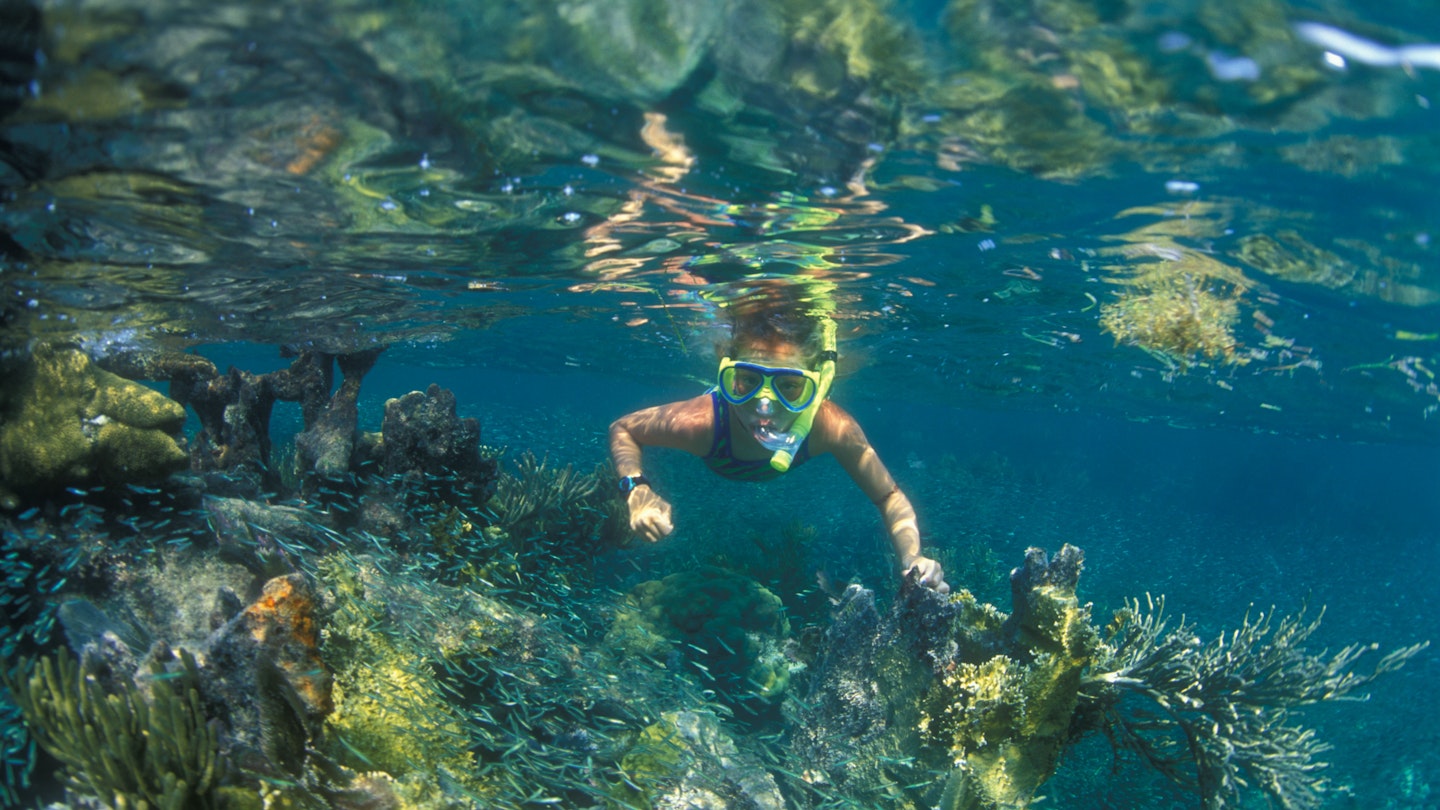
The Florida Keys dangle off the southern coast of the state like a string of pearls floating in Florida Bay, linked together by the Overseas Highway, more formally known as US Rt 1. However, to truly appreciate the beauty of the Keys, one must venture out onto the water, which is part of the Florida Keys National Marine Sanctuary, and discover an underwater playground.
The waters of the Keys are home to around 260 species of tropical fish, ranging from toothsome barracuda to a rainbow of wrasses, along with sea stars, sea urchins, spiny lobsters, and a variety of shrimp species. Additionally, the vibrant coral reefs and captivating underwater scenery offer a snorkeling experience that appeals to both beginners and seasoned snorkelers.
While most visitors associate the islands with Key West, the last island accessible by car, Key Largo stands as the closest major island to the mainland, offering fantastic snorkeling opportunities. Here are the best places to explore the underwater wonders of Key Largo.
YouTube video player
Snorkeling Dos & Don’ts in Key Largo
Accessing Key Largo’s John Pennekamp Coral Reef State Park is straightforward by car, but to reach offshore snorkeling spots, a charter tour by boat is necessary. If you find a destination that piques your interest, consult your charter captain to see if it’s included in their tour or if extra charges apply.
It’s important to note, however, that some local snorkel spots have relatively shallow bottoms. Thus, it is crucial to practice proper snorkeling etiquette by keeping your feet and flippers away from the coral to prevent damage.
Explore John Pennekamp Coral Reef State Park from Land
John Pennekamp Coral Reef State Park, the most popular snorkeling destination in Key Largo, is just shy of 60 years old and was the first underwater park in the United States, opening in 1963. Consequently, it attracts a large number of tourists annually. Most visitors come to this park, which is why it is highlighted here.
This park features two snorkeling beaches where, although coral may not be visible, a variety of fish can be observed. This type of shore snorkeling is ideal for children, beginners, or those who may not be confident in the water. More experienced snorkelers are encouraged to swim out to an 18th-century Spanish shipwreck, located about 100 feet offshore from the park.

Break Out with a Boat Tour at Pennekamp
Although swimming to the coral at Pennekamp is not permitted, the park offers 2.5-hour boat tours that take adventurers out onto the reefs, priced at $39 for adults and $35 for children. While these tours can get crowded, they provide an excellent opportunity for beginners, as one can hire park staff as snorkeling guides for an additional fee, allowing for a more tailored experience while observing diverse sea life, including iconic species like parrotfish and spiny Caribbean lobsters.
Discover the Secret of Sea Gardens
While calling Sea Gardens a “secret” might be a stretch, it is indeed one of the less-frequented snorkeling spots near Key Largo. Known as Mosquito Bank, this area features a shallow reef that attracts fewer visitors but boasts impressive clusters of soft coral, which sway in the tides resembling underwater trees.

Get Wet at Dry Rocks
Dry Rocks features “spur and groove” reefs, characterized by coral canyons, with some formations exposed during low tide. Notably, this area is home to a 9-foot statue of Jesus, known as the Christ of the Deep, placed here in 1965. Situated in approximately 25 feet of water, the statue often becomes a picturesque backdrop, surrounded by barracuda and rays, which are generally friendly towards snorkelers.
Slow Down for the Scenery at Molasses Reef
As the most visited reef in the Keys, Molasses Reef is a highlight of any snorkeling trip. Located about six miles offshore, it attracts larger marine fauna, including numerous sea turtles. Although popular, making snorkeling here weather-dependent, it offers some of the finest underwater experiences. With approximately 32 mooring buoys for snorkeling boats, it can get busy, but the rewards are abundant on calmer days.

Enter the Underwater World of Elbow Reef
Located approximately six nautical miles southeast of Key Largo, Elbow Reef consists of spur and groove coral formations. This crooked reef has been the downfall of many ships, including the City of Washington, which sank here in 1917. The 325-foot-long underwater ruin serves as a shelter and way station for various sea life, such as turtles and nurse sharks, making it a preferred spot for snorkelers.
Spot the Snappers at Snapper Ledge
The shallow reef at Snapper Ledge offers an excellent experience for both snorkeling and diving. With coral formations ranging from 15 feet to 25 feet deep, visitors can witness schools of Yellowtail Snapper swim gracefully through the currents. Additionally, be on the lookout for giant boulder brain coral, nurse sharks, and moray eels—a true spectacle of marine biodiversity. Snapper Ledge is situated about seven nautical miles south of Key Largo.




